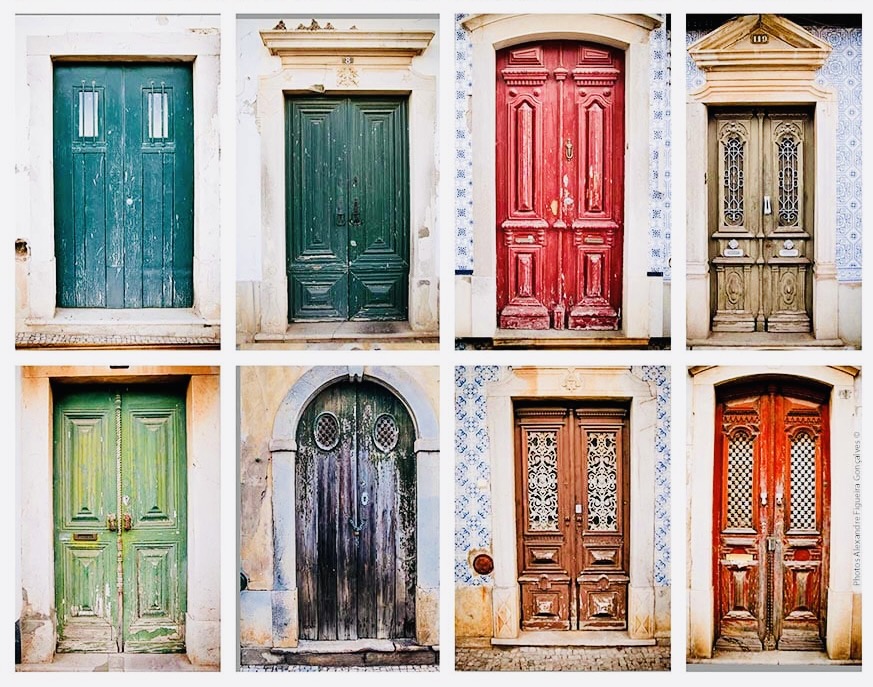tempo di lettura 2′
Nella foto, antichi portoncini nel Portogallo meridionale: una porta può aprire, chiudere, nascondere, separare, introdurre. Siamo orgogliosi di contribuire a questa ricerca -che continua a svilupparsi- di Zarine Jacobs e Regina Reinhardt. Qui gli stimoli emersi nei due workshop 2021
Sietar Italia
Coaches and interculturalist should pay attention…
The topic is a difficult one, sometimes also a taboo one!
We are used to talking about death either in an impersonal way, like statistics, something that happens to the others and we read in the newspapers. Or with emotion and pain, and a feeling of privateness when it is close to us or our loved ones.
Zarine and Regina were talking about it in an unusual way, adopting the language of warm observation and the keys of personal experience, and therefore melting the different “levels”. Several participants were involved in the lively virtual meeting chat sharing their emotions, hopes, fears and memories.
These were some of the rich themes that showed up and resonated with us.

- The idea of my personal death, how are we living with this consciousness? Do we talk about it? With irony, hope, despair or acceptance?
- Grief for the death of somebody I love, the focus on the remaining ones, on the loss
- The public side: rituals, behaviours, colours, timing, and music to express the pain and the loss as well as celebration of a life
- The practical things after the death, are we prepared to manage the death of somebody close? Do we know what to do? Who will be helping us?
- How health professionals look and talk about death, what is expected or accepted to be said to patients and their families
- What is a “good death”? Good for whom – the dead person or their family?
- The Eastern approach, which seems so far from the Western one, more holistic and accepting of death as a part of life
- Touched on the hospicing of our dying planet, no time to discuss the phenomenon of ‘climate grief’
- Have we made a will?
- Role of religion, and the belief of what is happening “after”, including reincarnation, which is critical to understand how death is seen and felt by cultures less familiar to us
- How is it, that if all of us have to die one day, it is such a terrible surprise to most people?
- Death as a transition, from a place to another one – never far from us who still live
- Unexpected death, perhaps of children, who can be more conscious/accepting than we may believe; the disruption for their families
- The Kübler Ross model, denial-anger-bargaining-depression-acceptance and what every step may mean
- Domesticate with the idea, and accept death as a part of life
- how can we implement death awareness into professional life?
- Birth, food, sleep, love, death: the main human facts according E.M Foster
- Do you have a food memory related to death and or funerals?
- The proper dressing, which colours, how long it lasts. Some families in 19th century in Italy used to paint black all the home furniture when the master died.
- Do you know or sing specific songs? are there people paid for singing, or screaming?
- Is a funeral dramatic for children? how can we talk and explain?
- In old times the children kissed the body of the beloved dead, and were not traumatised; nowadays many people in western world never have seen a dead body
- Death is sad when it is young people, less the older or ill ones
- Corpse is giving back something to the nature?
- Human planetary consciousness
- Narrative as homocentric, nature as a dehumanisation process, accepting the extinction of the planet
- We are killing mother earth and ourselves, the contrary of awakening or rebirth, mother earth is part of something else
- Cosmo-byological view. There is no dust but only energy, death is another form of energy, we are constantly on different layers of relationship with nature
- Binary system imposed with the anthropocentric view, and power to humans to manipulate and destroy
- Death doesn’t exist
- Body and soul, reincarnation
- God and death
- What a good death means for you, and how your culture influenced you
- Death cleaning, being organised, talk to children, take decisions about the body, to be factual about practical things, not to leave a mess for other people
- Funeral industry is a big business
- Opportunity to come face to face with our mortality
- Who do we want to receive us, when we die? Who will be easing our transition?
- Forgiveness
- Decolonising death
- Inequities in palliative cares
- Values
And a suggestion: the Dalai Lama Death Conquering Mantra
Much to integrate, consider and weave into our lives!

